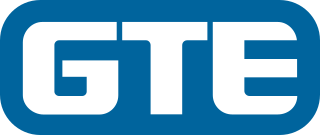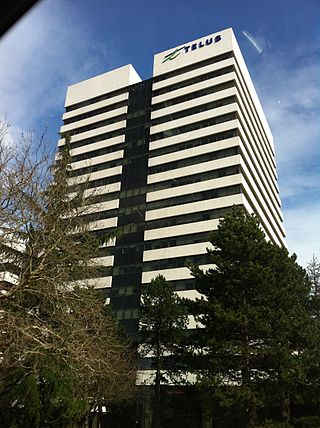Present-day telecommunications in Canada include telephone, radio, television, and internet usage. In the past, telecommunications included telegraphy available through Canadian Pacific and Canadian National.

The Canadian Radio-television and Telecommunications Commission is a public organization in Canada with mandate as a regulatory agency for broadcasting and telecommunications. It was created in 1976 when it took over responsibility for regulating telecommunication carriers. Prior to 1976, it was known as the Canadian Radio and Television Commission, which was established in 1968 by the Parliament of Canada to replace the Board of Broadcast Governors. Its headquarters is located in the Central Building of Les Terrasses de la Chaudière in Gatineau, Quebec.

GTE Corporation, formerly General Telephone & Electronics Corporation (1955–1982), was the largest independent telephone company in the United States during the days of the Bell System. The company operated from 1926, with roots tracing further back than that, until 2000, when it was acquired by Bell Atlantic, which changed its name to Verizon.

A telecommunications company is a kind of electronic communications service provider, more precisely a telecommunications service provider (TSP), that provides telecommunications services such as telephony and data communications access. Many traditional solely telephone companies now function as internet service providers (ISPs), and the distinction between a telephone company and ISP has tended to disappear completely over time, as the current trend for supplier convergence in the industry develops. Additionally, with advances in technology development, other traditional separate industries such as cable television, Voice-over IP (VoIP), and satellite providers offer similar competing features as the telephone companies to both residential and businesses leading to further evolution of corporate identity have taken shape.

The telecom sector in Bangladesh is rapidly emerging. Bangladesh Telecommunication Regulatory Commission (BTRC) is the regulatory authority for this sector, overseeing licensing, policy, etc.

Telus Communications Inc. (TCI) is the wholly owned principal subsidiary of Telus Corporation, a Canadian national telecommunications company that provides a wide range of telecommunications products and services including internet access, voice, entertainment, healthcare, video, smart home automation and IPTV television. The company is based in the Vancouver, British Columbia, area; it was originally based in Edmonton, Alberta, before its merger with BC Tel in 1999. Telus' wireless division, Telus Mobility, offers UMTS, and LTE-based mobile phone networks. Telus is the incumbent local exchange carrier in British Columbia and Alberta. Its primary competitors are Rogers Communications and Bell Canada. Telus is a member of the British Columbia Technology Industry Association.

Bell Canada is a Canadian telecommunications company headquartered at 1 Carrefour Alexander-Graham-Bell in the borough of Verdun, Quebec, in Canada. It is an ILEC in the provinces of Ontario and Quebec; as such, it was a founding member of the Stentor Alliance. It is also a CLEC for enterprise customers in the western provinces.
An incumbent local exchange carrier (ILEC) is a local telephone company which held the regional monopoly on landline service before the market was opened to competitive local exchange carriers, or the corporate successor of such a firm.
Bell Aliant Inc. is a brand name used by Bell Canada for telecommunications services in Atlantic Canada.
The United States Telecom Association (USTelecom) is an organization that represents telecommunications-related businesses based in the United States. As a trade association, it represent the converged interests of the country's telecommunications industry. Member companies represent a diverse set of communications-related businesses, including those that provide wireless, Internet, cable television, long distance, local exchange, and voice services. Members include large publicly traded communications carriers as well as small telephone cooperatives that serve only a few hundred customers in urban and rural areas. The organization was founded as the Independent Telephone Association of America in 1897, and represented the telecommunication industry of North America that was not affiliated with the Bell System led by the American Telephone and Telegraph Company (AT&T).
Northwestel Inc. is a Canadian telecommunications company that is the incumbent local exchange carrier (ILEC) and long-distance carrier in the territories of Yukon, the Northwest Territories, Nunavut, and part of northern British Columbia and northern Alberta. Originally established in 1979 by the Canadian National Railway from CN's northern telecommunications assets, it has been owned by BCE Inc. since 1988.

Allstream Inc. is a business communications provider based in Mississauga, Ontario, Canada, that provides Internet Protocol (IP) connectivity, managed IP services, unified communications and voice services to its customers in the United States and Canada.
The Stentor Alliance was a formal alliance of Canada's major telecommunications companies, specifically its incumbent local exchange carriers. It derives its name from the Greek mythological figure Stentor.

Embarq Corporation was the largest independent local exchange carrier in the United States, serving customers in 18 states and providing local, long-distance, high-speed data and wireless services to residential and business customers. It had been formerly the local telephone division (LTD) of Sprint Nextel until 2006, when it was spun off as an independent company. Embarq produced more than $6 billion in revenues annually, and had approximately 18,000 employees. It was based in Overland Park, Kansas.
The following outline is provided as an overview of and topical guide to telecommunication:

The Bell System was a system of telecommunication companies, led by the Bell Telephone Company and later by the American Telephone and Telegraph Company (AT&T), that dominated the telephone services industry in North America for over 100 years from its creation in 1877 until its antitrust breakup in 1983. The system of companies was often colloquially called Ma Bell, as it held a vertical monopoly over telecommunication products and services in most areas of the United States and Canada. At the time of the breakup of the Bell System in the early 1980s, it had assets of $150 billion and employed over one million people.

TDS Telecom is an American telecommunications company with headquarters in Madison, Wisconsin. It is a wholly owned subsidiary of Telephone and Data Systems Inc, and is the seventh-largest local exchange carrier in the U.S. TDS Telecom offers telephone, broadband Internet and television services to customers in 30 states and more than 900 rural and suburban communities, though it also serves some urban metropolitan communities. It also sells businesses communications services, including VoIP phone service, dedicated broadband Internet and hosted-managed services. With headquarters in Madison, TDS Telecom operates TDS Broadband LLC, and BendBroadband, and TDS Metrocom, LLC. Combined, the company employs nearly 3,300 people. In 2019, TDS Telecom and parent company TDS Inc. celebrated 50 years in business.
The Island Telephone Company Limited (IslandTel) was a Canadian telephone service provider located in the province of Prince Edward Island, Canada. It operated from 1929 to 1999, when merged into Bell Aliant.









